Research
On this page we present current contributions to research in electrical engineering and information technology
On this page we present current contributions to research in electrical engineering and information technology
Dr.-Ing Sabine Paarmann has been awarded a highly endowed research grant from the Federal Ministry of Education and Research (BMFTR). As part of the “BattFutur – Junior Research Group for Battery Research” competition, her project will receive €2.7 million in funding over the next five years. This initiative is a central component of the German government’s high-tech strategy and aims to create optimal conditions for outstanding scientists in German battery research.
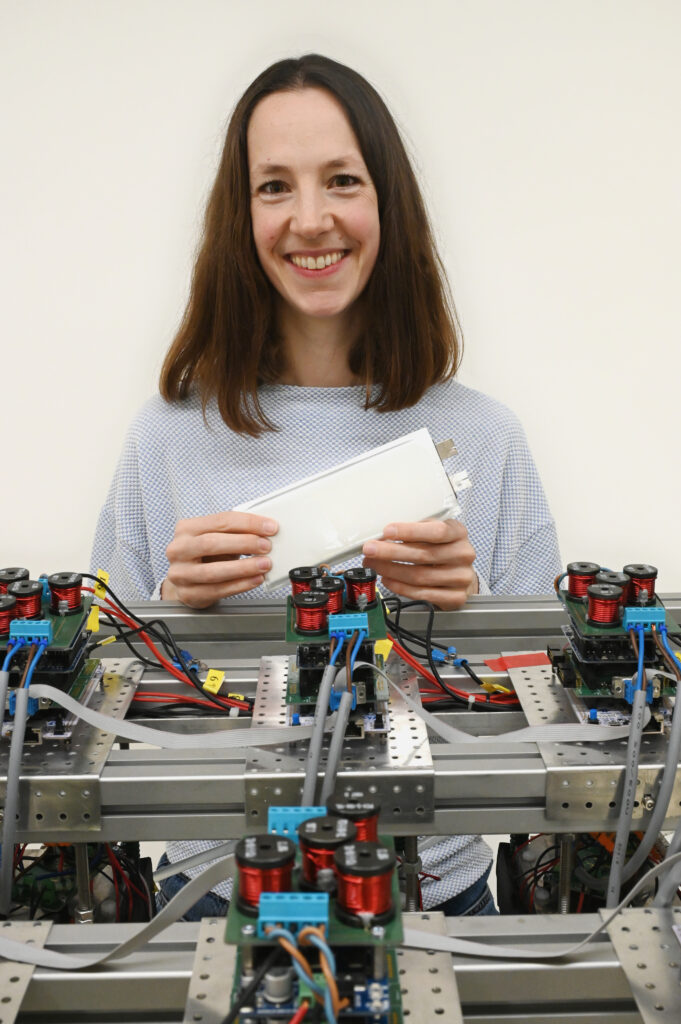
ISEA
In her project “CooLIB – Thermal design and cooling strategies to boost the performance and lifetime of lithium-ion batteries,” Dr. Paarmann and her team are developing innovative cell concepts. The focus is on investigating thermal and electrochemical inhomogeneities within the cells. Systematic cycle tests are used to measure these inhomogeneities and quantify their interactions in order to specifically reduce their influence. The research results will be directly incorporated into the development of new battery cells and thermal management in order to make future batteries more efficient and durable.
The new research group “Thermal-Electrical Design of Energy Storage Systems” headed by Dr. Paarmann is based at the Center for Ageing, Reliability, and Lifetime Prediction of Electrochemical and Power Electronic Systems (CARL) at RWTH Aachen University. Dr. Paarmann has excellent scientific expertise: she received her doctorate in 2021 from KIT in Karlsruhe in the Department of Chemical Engineering and Process Engineering and, before moving to RWTH Aachen University, conducted research as a DFG-funded postdoc at Imperial College London.
The Faculty of Electrical Engineering and Information Technology is delighted to welcome Dr. Paarmann as the new group leader at ISEA and looks forward to the coming years of research and a successful collaboration.
What will the hearing aid of the future look like? And how can the human brain help us build more efficient computers? From March 3 to 5, 2026, as part of the workshop “NeuroSensEar – Neuromorphic Acoustic Sensors for Tomorrow’s High-Performance Hearing Aids”, the Institute of Communications Engineering at RWTH Aachen University invites you to three high-profile public lectures in Lecture Hall FT (Melatener Str. 23, 52074 Aachen).
The “NeuroSensEar” project is dedicated to one of the most exciting challenges in current technology: the development of neuromorphic acoustic sensor technology. The goal is to create powerful hearing aids that not only amplify sound better, but also act intelligently and energy-efficiently, just like our brains.
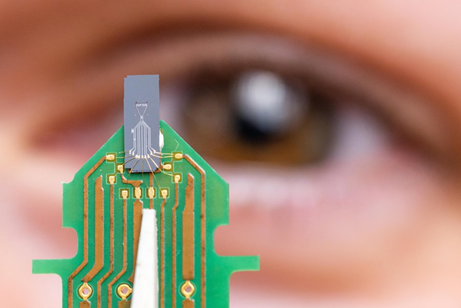
IENT
Accompanying the workshop, three renowned professors from our faculty will provide exclusive insights into their research.
Neuromorphic Computing: Energy Efficiency Through Biologically Inspired Hardware – Tuesday, March 3, 2026 | 5:00 p.m.
Prof. (ret.) Dr.-Ing. Dr. h.c. Rainer Waser
Information technology is facing a paradigm shift: classic, algorithmic data processing is increasingly being replaced by AI-based approaches. This is accompanied by a massive increase in energy consumption. To reduce this, institutes in Faculty 6 are researching neuromorphic systems that work much more efficiently than conventional architectures.
In the upcoming lecture, Prof. Waser will present the physical fundamentals of redox-based memristive components. The focus is on an interdisciplinary approach between materials science, electrical engineering, and computer science that uses the functioning of the human brain as a technical model.
In addition to hardware development, specific AI applications and their social opportunities and risks will be discussed. The lecture will conclude with a reflection on the question of whether future AI systems could develop consciousness.
Real hearing in the laboratory: Hearing research in interactive VR environments – Wednesday, March 4, 2026 | 2:00 p.m.
Prof. Janina Fels
Until now, research into auditory perception and cognitive processes has often relied on controlled but unrealistically simplified laboratory scenarios. The Institute of Hearing Technology and Acoustics (IHTA) at RWTH Aachen University is now using modern audiovisual virtual reality (VR) to simulate complex everyday situations in a realistic and interactive way.
This technology allows test subjects to interact with acoustic scenes in real time. This enables the precise investigation of hearing and attention in acoustically challenging environments such as open-plan offices or busy outdoor areas. A current research focus of the IHTA is the analysis of noise pollution, attention, and listening effort in elementary school classrooms.
The presentation highlights how VR methods bridge the gap between classical hearing psychology and real-life environments. It also discusses how interdisciplinary approaches from audiology and virtual reality are shaping the future of hearing research.
Glasses for the ears: Intelligent communication systems of the future – Thursday, March 5, 2026 | 9:00 a.m.
Prof. Dr.-Ing. Peter Jax
Smart hearables are increasingly evolving from simple headphones to intelligent microcomputers with integrated AI. As “glasses for the ears,” these systems act as personal assistants in the areas of consumer audio, health, and professional communication.
One key potential of this technology lies in 3D telephony. Spatial audio reproduction enables intuitive differentiation between speakers, which greatly enhances immersion and the sense of presence in digital meetings. The goal is communication that achieves the naturalness of a face-to-face conversation despite physical distance.
The presentation highlights current developments in research and industry and discusses the acoustic and technical challenges that must be overcome in the design of such innovative platforms.
With the founding of the Institute for Power Electronics and Electrical Drives (ISEA) in 1965, our Faculty of Electrical Engineering and Information Technology at RWTH Aachen University began a research tradition in the fields of power electronics, electrical drives, and electrochemical energy storage that continues to this day. At a time when the faculty itself was still in its infancy, ISEA laid the foundation for a close connection between basic research and industrial application.
Over six decades, a small team of around ten employees has grown into one of the most internationally renowned institutes in its field, with more than 150 employees today. For almost 30 years, ISEA has been headed by Professor Rik W. De Doncker, whose work has had a significant influence on modern power electronics in particular.
From the outset, one of the institute’s central research goals has been the development of emission-free electric drive systems. Applications for rail vehicles and the first electric vehicles were investigated at an early stage – long before electromobility became a key social issue. ISEA has made significant scientific contributions to the digital control of rotating field machines, PWM space vector modulation, and the further development of the switched reluctance machine (SRM), among other things. With the introduction of Direct Instantaneous Torque Control (DITC) in 2000, the SRM was established as a robust, cost-effective, and rare earth-free alternative in the drive sector.
ISEA also provided lasting impetus in the field of power electronics. Particularly noteworthy is the dual active bridge developed by Professor De Doncker, which is now used as a central circuit concept in numerous DC/DC converters. Its fields of application range from vehicle and industrial drives to household appliances, renewable energy systems, battery storage, and DC networks.
Since the 1970s, battery storage research has also been an integral part of the institute’s work. While the initial focus was on lead batteries, lithium-ion technology has been specifically expanded since the turn of the millennium. Germany’s largest university battery testing center was established at the Rothe Erde site, supplemented by a 5 MW storage system. Current research focuses on modeling and life cycle prediction, the development of battery management systems, industrial electrode manufacturing, and AI-supported methods for operation and analysis.
The last twenty years have also been marked by targeted structural development: new professorships, the establishment of the E.ON Energy Research Center (E.ON ERC), the Flexible Electrical Networks (FEN) research campus, and the construction of the new CARL research building, which now houses most of ISEA. The research environment is complemented by the Helmholtz Institute Münster (HI MS) under the direction of Professor Martin Winter.

photo: heroal
With excellent laboratory equipment, over 230 completed doctorates, more than 1,000 theses, and over 2,000 scientific publications, ISEA is a prime example of our faculty’s research strength and support for young scientists. After 60 years, the institute remains a key driver of scientific innovation and academic education in the field of electrical energy technology.
A packed auditorium and lots of curious students: the first MINT Science Slam at RWTH Aachen University was a resounding success. Over 30 schools from the region brought their upper school classes to the MINT Science Slam to gain an entertaining insight into the diversity of MINT degree programmes.
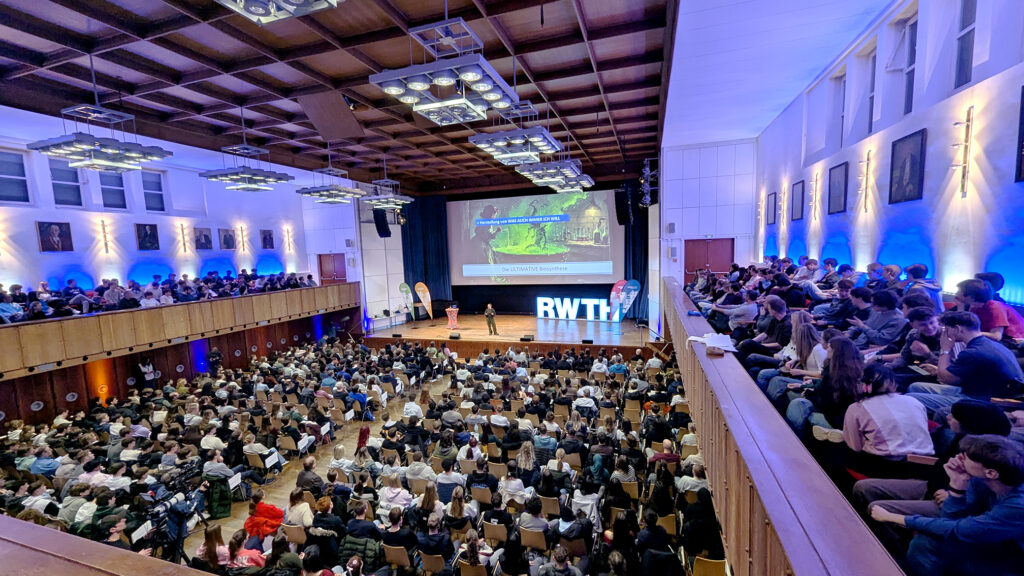
Daphne Heil und Melih Dal
The concept behind Science Slam is simple and effective: young scientists present their research topics in a clear, creative and enthusiastic manner in a maximum of ten minutes. The school pupils then evaluate the presentations themselves. This provides a lively insight into the diversity of STEM subjects, from mechanical engineering and biotechnology to medicine and electrical engineering.
Felix Walger was also there. In his slam, ‘Tailor-made medicine (technology) for everyone’, he impressively demonstrated how engineering research enables concrete social and medical applications. His presentation highlighted the central role that electrical engineering plays in the development of modern, personalised medical technology, a topic that met with great interest among the school pupils.
Alongside Walger, other young researchers took to the stage, including Rosario Othen, who won the slam with his presentation on coffee, paper and science, as well as contributions on topics such as cancer research, biotechnology, mathematics and sustainable energy. Knowledge transfer met entertainment.
The MINT Science Slam was first held as a joint project between the RWTH Knowledge Hub and the Central Student Advisory Service at RWTH Aachen University. In his welcoming speech, Professor Joost-Pieter Katoen, Vice-Rector for Teaching at RWTH, emphasised the importance of STEM subjects as key technologies for understanding our world. The slam was entertainingly moderated by Elena and Martin Lichtenthaler, supported by the Campus Dance Crew, who added to the excitement.
The STEM Science Slam impressively demonstrated how important low-threshold, inspiring formats are for study orientation and how diverse, relevant and exciting STEM research at RWTH is. For the Faculty of Electrical Engineering and Information Technology, Felix Walger’s participation was a successful example of how research, teaching and the promotion of young talent can be effectively combined.
Our electricity grids are essentially 19th-century technology. For over a hundred years, they’ve operated as a single, massive synchronized block. But today, that rigidity is a liability. Volatile wind and solar sources don’t provide the physical stability we used to get from traditional power plants, and recent events—like the 2026 cyberattack in Berlin—showed just how easily a local failure can threaten the entire system.
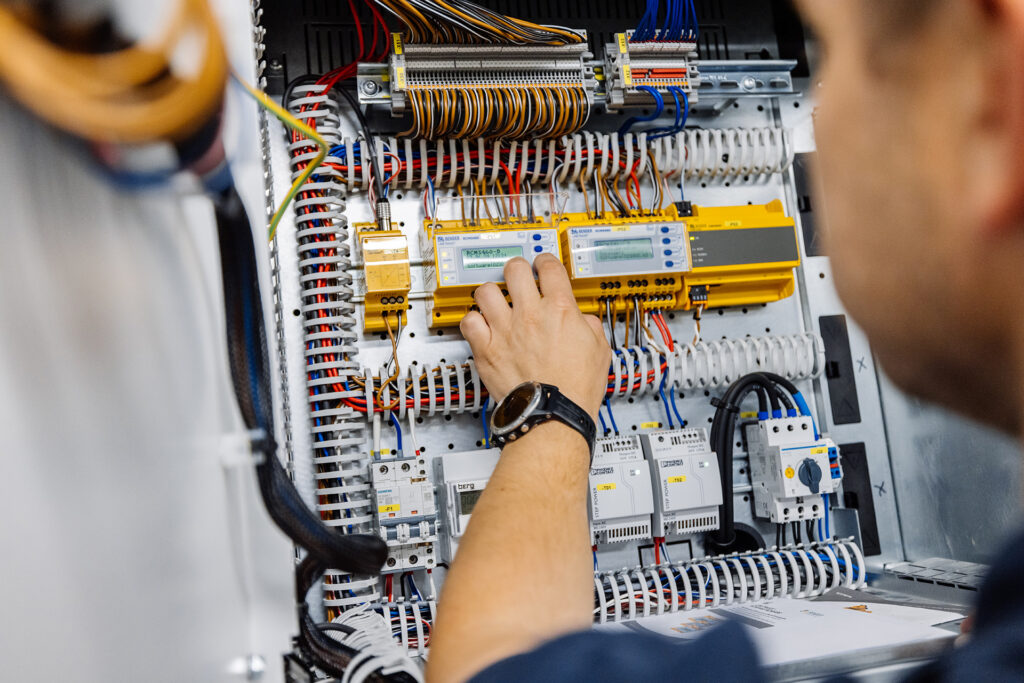
Martin Braun
To fix this, a research team from our faculty and Aalborg University just published a new approach in Nature Reviews Electrical Engineering. The work is led by Professor Antonello Monti, who heads the Institute for Automation of Complex Power Systems (ACS) at our faculty. The idea is simple: treat the grid like the internet. Instead of one giant, fragile unit, Monti’s team proposes breaking the grid into smaller, autonomous “sub-nets”. Because these parts are connected asynchronously, a fault or an attack in one area stays isolated. The rest of the network just keeps running.
This is the core of the SAFEr Grid project, an ERC Synergy Grant initiative coordinated by RWTH. We aren’t talking about a massive, overnight construction project. It’s a long-term evolution to build a grid that handles renewables by design and is tough enough to stop a local glitch from becoming a regional disaster.
Starting in January 2026, the project “6GEM+: Value-oriented 6G Communication Systems for the Networked Digital Industry” has officially launched. Led by Professor Haris Gačanin, who holds the Chair for Distributed Signal Processing at our faculty, this initiative marks the transition from pure research to practical industrial transfer.
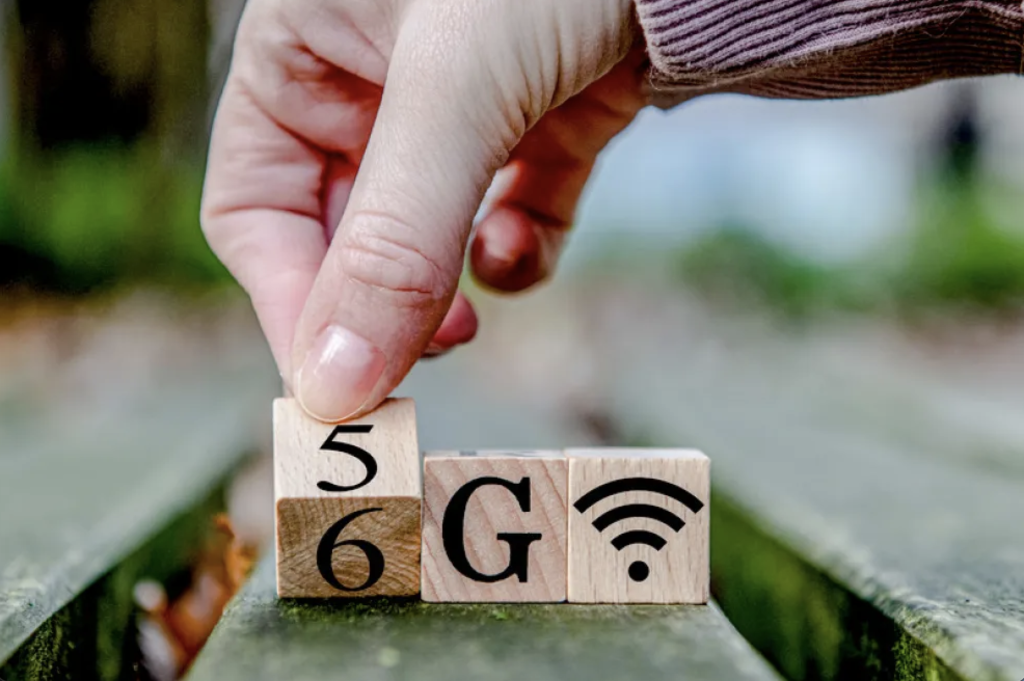
RUB, Marquard
While 5G laid the groundwork for mobile connectivity, it faces limitations in demanding industrial environments. Current systems often struggle with integrated AI computing, real-time data transmission, and the ultra-low latency required for advanced robotics. The 6GEM+ Transfer Hub is designed to overcome these barriers, ensuring that the next generation of networks can support fully autonomous logistics and AI-driven production.
Supported by 25 million euros in funding from the Federal Ministry of Research, Technology, and Space (BMFTR), the project will run for four years. It brings together a powerful consortium including TU Dortmund, Ruhr-Universität Bochum, and the Fraunhofer Institutes for Production Technology (IPT) and Material Flow and Logistics (IML). A key element of this project is the involvement of industrial “use-case mentors” who provide real-world insights to ensure that the developed technologies are not just innovative, but ready for the factory floor.
The Faculty of Electrical Engineering and Information Technology congratulates Prof. Max Lemme on a special scientific achievement: as co-author, he contributed to a consensus statement publication in the renowned journal Nature Photonics. The publication is entitled ‘Guidelines for accurate evaluation of photodetectors based on emerging semiconductor technologies’ and provides important impetus for the international research community.
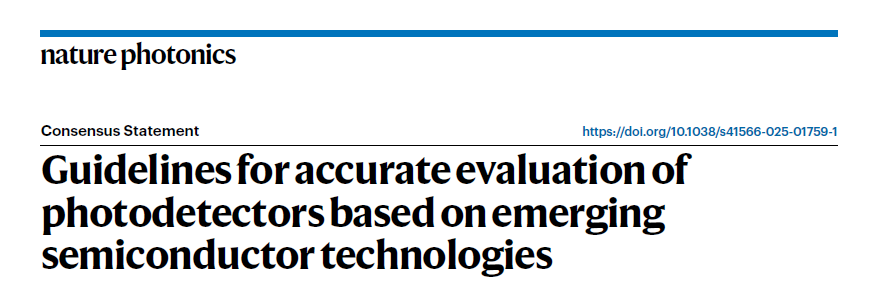
A consensus statement publication summarises the current state of knowledge in a specialist field and formulates recommendations, standards or procedures that promote reliable and uniform scientific practice. In this article, leading experts from research and industry have developed for the first time a comprehensive framework for the precise characterisation, documentation and comparability of photodetectors based on novel semiconductor materials.
There is a great need for such guidelines: photodetectors made from innovative material classes such as organic semiconductors, perovskites, quantum dots, two-dimensional materials, metal oxides and carbon nanotubes have made enormous progress in recent years. At the same time, inconsistent measurement methods and reporting standards have so far made it difficult to compare different studies and thus hindered scientific development in this field.
The recommendations that have now been published create a common foundation for the community and support transparent, reproducible and comparable research practices. This benefits not only academic working groups, but also industrial development processes and the emergence of future photonic technologies.
Prof. Max Lemme is not only the holder of the Chair of Electronic Components at our faculty, but also the managing director of AMO GmbH, whose research focuses are closely linked to the topics covered in the publication. The development and integration of novel materials for optoelectronic components is one of the company’s core activities. Participation in this international consensus paper underscores the great scientific and technological relevance of this work.
AMO GmbH has also highlighted the publication in its own article. Further information can be found on the website and on LinkedIn.
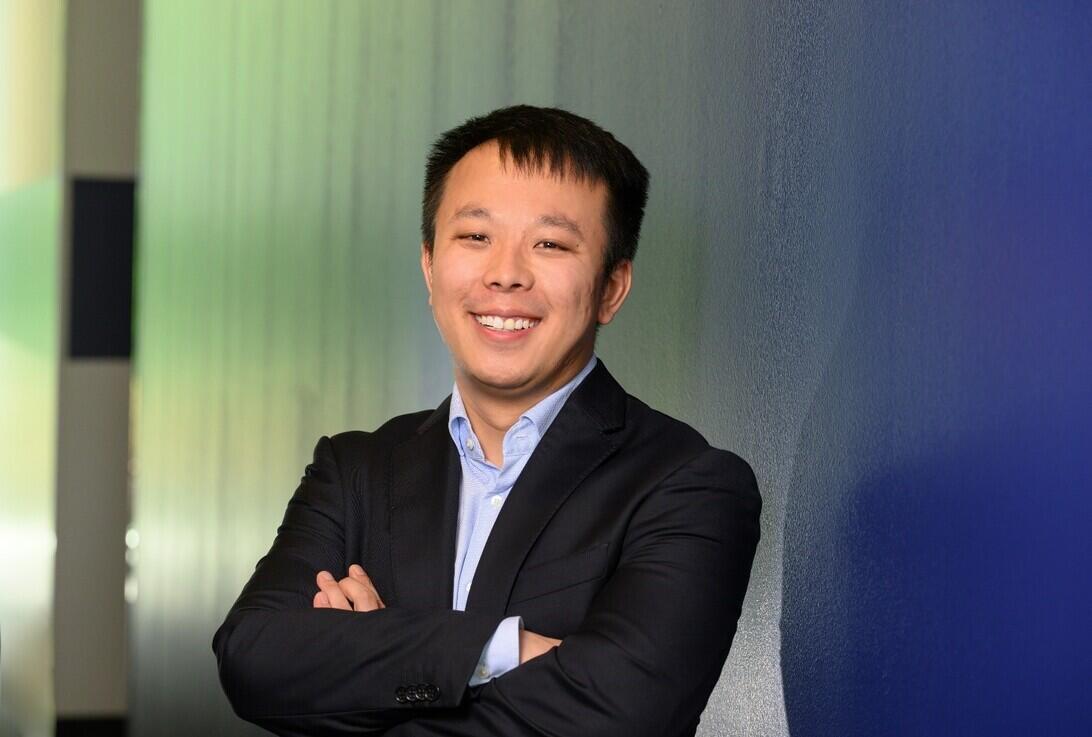
Professor Weihan Li, holder of the Junior Professorship in ‘Artificial Intelligence and Digitalisation for Batteries’ © David Ausserhofer
Professor Li, from the Institute for Power Electronics and Electrical Drives (ISEA) at RWTH Aachen University, has once again been included in the list of the world’s most cited scientists, known as ‘Highly Cited Researchers’. This recognition is a testament to the influence of his work in the field of AI-supported battery research.
The list of ‘Highly Cited Researchers’ is published annually by Clarivate Analytics. Based on the citation index of the Web of Science Core Collection, it identifies scientists whose publications are among the top one per cent most cited in their field and publication year. In scientific contexts, citations serve as an indicator of a publication’s relevance and are considered a measure of its quality. The more frequently a text is cited, the greater its visibility and the greater the global perception of the author. The current list includes 7,131 researchers who, according to the database, are among the most influential 0.1 per cent of the international research community.
Batteries are a key technology in the energy transition. Their performance largely determines the range, safety, service life and cost of their technical applications. Professor Li is investigating how accurately the condition and performance of battery cells can be predicted during production. He has held the Junior Professorship for ‘Artificial Intelligence and Digitalisation for Batteries’ at RWTH Aachen University since March 2025. At the Centre for Ageing, Reliability and Lifetime Prediction of Electrochemical and Power Electronic Systems (CARL), his junior research group develops data-based models, digital twins and automated diagnostic procedures.
The aim is to make the battery digitally communicative, characterised by precision and real-time capability – Weihan Li is working on this future.
His project, ‘SPEED: Fast Performance Characterization of Lithium-ion Batteries from Production Lines with Machine Learning’, has been awarded a grant of €1.85 million by the Federal Ministry of Research, Technology and Space as part of the ‘BattFutur – Junior Research Group Battery Research‘ competition.
Professor Li was born in China and completed his studies in automotive engineering at Tongji University. In 2014, he came to RWTH Aachen University to undertake a Master’s degree in Electrical Engineering and Information Technology, subsequently completing his PhD at the Institute for Power Electronics and Electrical Drives. His research has also taken him to Imperial College London, the University of Oxford and the Massachusetts Institute of Technology (MIT). He completed his doctorate with distinction in 2021 and founded the junior research group ‘Artificial Intelligence for Batteries’ the following year. With support from industry collaborations (accounting for around 40% of third-party funding) and CARL’s infrastructure, which comprises over 6,000 test circuits and provides a reliable database for AI modelling, he has grown the group to include 13 doctoral students.
The scientist can now look back on receiving a number of awards and prizes, including the highly prestigious German Study Prize from the Körber Foundation, one of the most highly endowed prizes for young scientists in Germany. He has published 53 scientific articles, two monographs, three patents and has supervised over 40 theses.
Further information on Professor Weihan Li’s research and career can also be found on the RWTH Aachen University website.
The German Academy of Science and Engineering, acatech for short, has accepted four scientists from RWTH Aachen University as new members: Fabian Kießling, Max Lemme, Constantin Häfner and Walter Leitner.
acatech is the central voice of technical sciences in Germany and is funded by the federal and state governments as a national academy. It advises politicians and society independently, factually and in the public interest on issues relating to shaping the future of technology. Its members come from the fields of engineering and natural sciences, medicine, and the humanities and social sciences. The patron of the academy is the Federal President.
With the admission of the four new members, a total of 35 scientists from RWTH Aachen University are now part of acatech. In addition to Professor Max Lemme, Professor Rainer Waser, Professor Dirk Uwe Sauer, Professor Jürgen Roßmann, Professor Rik W. de Doncker and Professor Steffen Leonhardt from the Faculty of Electrical Engineering and Information Technology are also members of the academy.
Max Lemme: Research into the electronics of the future
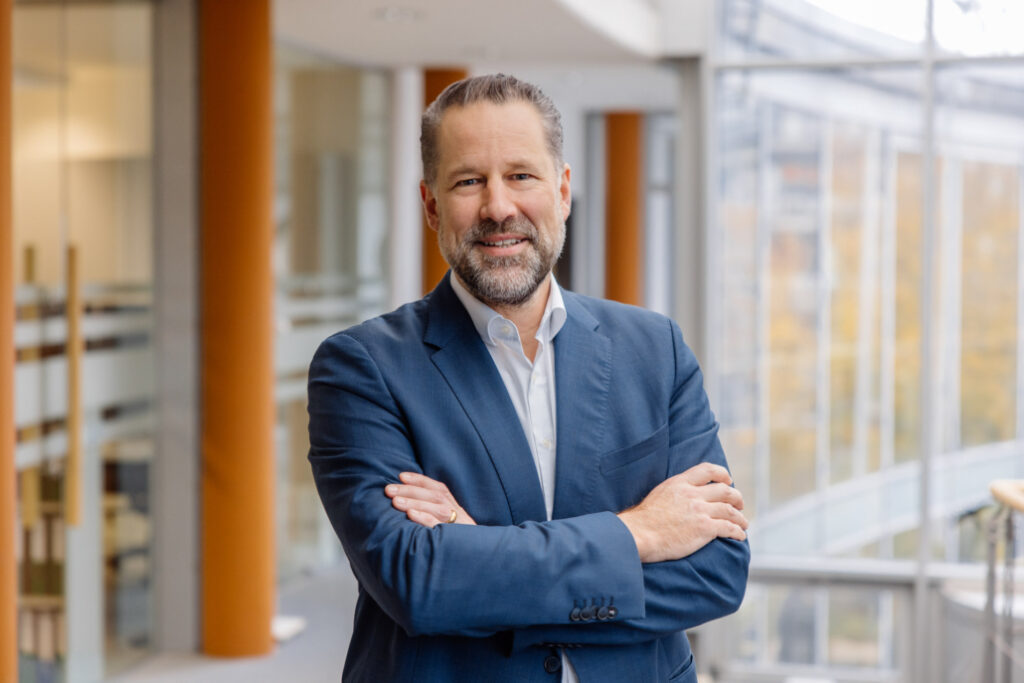
© Martin Braun
Professor Max Lemme holds the Chair of Electronic Components at RWTH Aachen University and is managing director of AMO GmbH. His research focuses on novel electronic and optoelectronic components based on two-dimensional materials such as graphene. The aim is to integrate these materials into future micro- and nanoelectronics, sensor technology and neuromorphic computing systems. Lemme is also spokesperson for the NeuroSys future cluster.
In addition to him, three other outstanding researchers from RWTH Aachen University were accepted into acatech: Professor Fabian Kießling, Director of the Helmholtz Institute for Biomedical Engineering and pioneer of molecular imaging, Professor Constantin Häfner, Director of Research and Transfer at the Fraunhofer Society and expert in high-power lasers, and Professor Walter Leitner, Chair of Technical Chemistry and Petrochemistry and Director at the Max Planck Institute for Chemical Energy Conversion.
Their admission recognises their scientific achievements and their contribution to the further development of technical sciences in Germany.